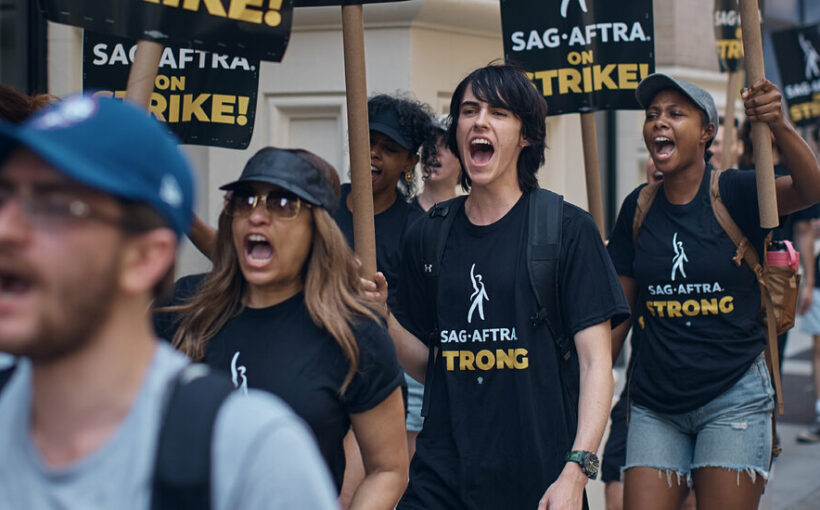It was 10 a.m., adoring union members had already more or less mobbed their president, Fran Drescher, and the crowd was growing by the minute.
Outside Netflix offices in Hollywood, a festive, celebratory mood had taken over the intersection of Sunset Boulevard and Van Ness Avenue. It was a workers’ strike, to be sure. But it felt a little like a summer Friday street party — one with a few famous guests.
“We’re told that we should just be so grateful to get to do what we love to do — but not being compensated, not being protected while they are profiting off of our work,” said Amanda Crew from HBO’s “Silicon Valley,” who walked the picket line with Dustin Milligan from “Schitt’s Creek.”
“That’s the myth of the actor: You’re doing art so you should just be so grateful because you’re living your dream. Why? Do we do that to doctors? We bring so much joy to people by entertaining them,” Crew added.
It was the first of what could be many days of marching for actors, who picketed at locations across the country. They chanted, “Actors and writers unite!” as they marched along a short block in Times Square where Paramount conducts business; they passed out bottles of cold water and cans of La Croix outside 30 Rockefeller Plaza in Midtown Manhattan; and they bounced their picket signs to the sounds of Jay-Z’s “Dirt Off Your Shoulder” as it blared from a speaker in Hollywood.
A day earlier, the Hollywood actors’ union, known as SAG-AFTRA, approved a strike for the first time in 43 years, joining forces with writers, who walked out more than 70 days ago.
“There’s a renewed sense of excitement and solidarity,” said Alicia Carroll, a strike captain for the Writers Guild of America. “Writers have been out here for upwards of 70 days. It’s been a while and it’s hot. People are tired. So this is a confidence boost that we’re not alone in the industry in terms of issues.”
The actors and writers have been unable to agree to new contracts with the Alliance of Motion Picture and Television Producers, which represents major studios and streamers. Pay is a central issue, but the negotiations around compensation have been complicated by the emergence of streaming services and the rise of artificial intelligence.
Actors, including Ms. Drescher, the president of the actors’ union, have cast the moment as an inflection point, arguing that the entire business model for the $134 billion American movie and television business has changed. They say their new contract needs to account for those changes with various guardrails and protections, including increased residual payments (a type of royalty) from streaming services. They are also worried about how A.I. could be used to replicate their work: scripts in the case of writers and digital replicas of their likenesses for actors.
Hollywood companies have insisted that they worked in good faith to reach a reasonable deal at what has also been a difficult time for an industry that has been upended by streaming and is still dealing with the lingering effects of the pandemic.
“The union has regrettably chosen a path that will lead to financial hardship for countless thousands of people who depend on the industry,” the studio alliance said in a statement after SAG-AFTRA announced the strike.
On Friday, writers said they were heartened to be joined on the picket lines by actors, many of whom have been marching with them for months in the black-and-yellow T-shirts that have become something of a uniform. It is the first time since 1960 that actors and screenwriters have been on strike at the same time.
WGA leaders have shared picket line advice: Bring plenty of sunscreen and set a timer to reapply, watch out for traffic. But some actors were already veterans.
“I have not been to a picket without SAG-AFTRA members there. Sometimes they have even outnumbered us here in the east,” said Lisa Takeuchi Cullen, a vice president of the Writers Guild of America, East. “They have been our stalwart supporters and comrades, and we intend to reciprocate.”
“Suddenly,” she added, “the sleeping giant has awaked.”
An animated Ms. Drescher, in a white SAG-AFTRA cap with the words “negotiating committee,” arrived to an exuberant crowd that wrapped themselves around her when she visited the picket lines in front of the Netflix offices in Los Angeles.
“I’m not really here for me as much as the 99.9 percent of the membership who are working people who are just trying to make a living to put food on the table, pay rent and get their kids off to school,” she said. “They are the ones that are being squeezed out of their livelihood, and it’s just pathetic.”
Shara Ashley Zeiger, an actor, brought her 2-year-old, Lily, to the picket in front of NBC’s offices in New York. A sign protruded from her daughter’s stroller. Lily played with her food — and a tambourine.
“The effects of this deal directly affect my daughter and my family,” Ms. Zeiger said.
She added: “I had had a role on a project that was on a streamer, and their deal was they didn’t have to pay me residuals for two years. And it was in the middle of the pandemic.”
Corina Knoll is the Los Angeles bureau chief. She writes features about California and covers breaking news. Previously, she spent more than a decade with The Los Angeles Times, where she contributed to two Pulitzer Prizes. More about Corina Knoll
Matt Stevens is an arts and culture reporter for The Times based in New York. He previously covered national politics and breaking news. More about Matt Stevens
Source: Read Full Article
